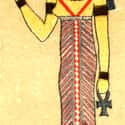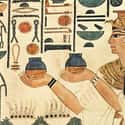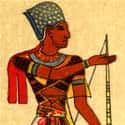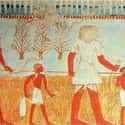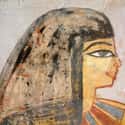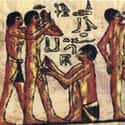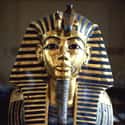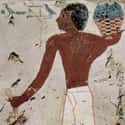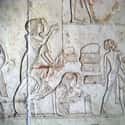-
(#1) They Braved Vicious Hippos To Commute Via Boat
Ancient Egyptian society depended on the Nile River for nearly everything. They used it to irrigate their crops, make their clothes, and even get from place to place. The lower class would use skiffs - boats made out of papyrus reeds - for their day-to-day traveling. More elaborate ships were constructed from acacia wood to transport the large stones used in pyramid construction.
Besides commuting, boats also served ceremonial purposes. They were used in funeral processions, when the mummified body of a noble would be transported down the river to his burial site by boat.
These journeys weren't always safe. People who traveled on the Nile had to keep an eye out for hippos and crocodiles. At least one pharaoh, Menes, was reportedly attacked and killed by a hippo. Dr. Benson Harer, a physician and Egyptologist, even theorized that King Tut was maimed by a hippo, eventually leading to his premature death.
-
(#2) They Loved (And Ate) Beer
The ancient Egyptians didn’t just love beer, they depended on it for daily sustenance. Evidence of beer making in Egypt can be traced back to 18,000 years to the Paleolithic site of Wadi Kubbaniya. In ancient Egypt, beer was consumed by both children and adults, and was a staple of their diet just like bread. Even their wages were paid in grain, which would be used to make bread and beer (actual coinage was not introduced until the Late Period).
While drinking your dinner might not sound appetizing, the beer the ancient Egyptians imbibed was more like a meal. It was thick and soupy, not too intoxicating, and probably sweet. They loved beer so much they had several gods and goddesses for it, and they considered Ra - the sun god - to be the creator of beer.
-
(#3) They Had Dentists And Gynecologists
Ancient Egyptian medicine was surprisingly advanced. They had many specialized fields, including dentistry, gynecology, surgery, and autopsy, all typically performed with some element of religious ceremony as well as medical treatment. Healthcare was also apparently accessible to everyone. Even slaves were given medical treatment.
Most of the evidence found concerning ancient Egyptian medicine comes from the Edwin Smith and Ebers Papyrus, dating back 3000 BCE. Here researchers saw the earliest mention of dentistry as well as detailed procedures on how to cure particular ailments.
-
(#4) They Were Obsessed With Hygiene And Invented Deodorant
The ancient Egyptians were known for their cleanliness. They were terrified of disease and correctly made the connection between poor hygiene and illness. They bathed frequently and made soaps from animal and vegetable oils mixed with alkaline salts. Both men and women would shave their head and body hair. Gold razors were even discovered in tombs, along with tweezers.
They also liked looking and smelling good. The Egyptians concocted many different perfumes using ingredients like lily, myrrh, and cardamom. They are also thought to have created the first deodorant with a combination of citrus and cinnamon.
-
(#5) They Believed They Thought With Their Hearts
While the ancient Egyptians understood many things about anatomy, they weren’t always correct about the organs’ biological functions. They believed that the heart - or the ib - was where thought originated from within the body. They also thought it was the center of love, sadness, and bravery, images that remained in the popular consciousness until modern times.
So what did ancient Egyptians think of the brain? Not much, apparently - they discarded the brain during the mummification process.
-
(#6) Statues Could Decide Major Court Cases
There were two judicial courts that would decide on cases in ancient Egypt: the kenbet and the great kenbet. The lower kenbet court would deal with minor disputes, while the greater court would deal with crimes such as robbery and murder. The vizier, or the highest ranking official under the pharaoh, would rule in these cases. The pharaoh was the official head of the legal system and his word was the final judgment. However, in complicated cases ancient Egyptians would refer to oracles, or the statue representations of these deities.
The prosecution and defense would compile their arguments on papyrus and place them on either side of the street. The side to which the statue leaned closer towards was decided the winner.
-
(#7) Children Didn’t Wear Clothing Until They Were Six
In ancient Egypt, children didn’t don clothing until they were about six years old. Although they were nude, they would wear jewelry such as necklaces and anklets. Once the children got older they would wear the same style of clothing as their parents, though the styles depended on their place in the social hierarchy.
-
(#8) They Used Garlic To Test Fertility
Ancient Egyptians understood that sex lead to pregnancy, but they weren’t quite sure how everything was connected. They thought that a woman’s womb was attached to the alimentary canal - the path your food takes from your mouth to your anus. Thus, putting a clove of garlic in a woman’s vagina would test her fertility. If garlic could be smelled on the breath of the woman, then she was fertile. If her breath didn’t smell like garlic, that meant that she had a blockage in the canal, and therefore could not get pregnant.
They also thought the origin of sperm was the bones, not the testicles.
-
(#9) They Played Board Games To Pass The Time
Ancient Egyptians loved board games, and perhaps the most popular board game from their time was Senet. Senet is a game consisting of 30 painted squares laid out in three rows of 10. Each player had pieces that they would move along the board after rolling dice or throwing sticks.
The game was so popular that there are temple paintings of Nefertari playing Senet. A version of the game was also found among the possessions in King Tutankhamen’s tomb.
-
(#10) Circumcision Happened Later In A Boy's Life
Circumcision in ancient Egypt didn’t happen at birth, but was considered a rite of passage into manhood. The majority of Egyptian pharaohs were circumcised, with a few exceptions - namely Ahmose I and Amunhotep I. Circumcision might have been reserved for the elite, or perhaps it just wasn't the cultural norm. Temple paintings dating back to 4000 BCE show priests performing the ritual using sharp utensils.
Some historians also theorize that circumcision was a mark for slavery. Captured soldiers would have their penises circumcised to humiliate them before being sold. Eventually, the male descendants of these slaves were all circumcised. This could speak to the adoption of the practice by Judaic peoples, who were enslaved by the Egyptians.
-
(#11) Men And Women Wore Lead-Based Makeup
Ancient Egyptian men were not shy about wearing a little makeup, particularly lead-based eyeliner. Eye makeup was made by grinding ores into a substance known as kohl.
Although it's now widely accepted that lead products are toxic to humans, research has shown that these cosmetics had a high concentration of nitric oxide. Nitric oxide is a compound that boosts the immune system and fights off disease - meaning that this ancient eye makeup could potentially help stave off eye infections.
-
(#12) Their Temples Doubled As Banks
Ancient Egyptian temples were not only places of worship, but they also stored the wealth of the kingdom. Before coinage was introduced in the region, the ancient Egyptians worked on a barter system. Grain was the main source of wealth for the empire, and the temples had a system of granaries. Administrators would then redistribute the grain in a wage-ration to workers and professionals throughout the area. 10 loaves of bread and two full jugs of beer could be the standard wage for the lowliest paying job in the ancient Egyptian empire.
-
(#13) They Were Mostly Vegetarians
Despite living on the Nile River, ancient Egyptians didn’t consume much fish. According to a study published in the Journal of Archeological Science, Egyptians had a primarily vegetarian diet. The researchers tested carbon isotopes in the remains of 45 Egyptian mummies and found that their meals were based primarily on wheat and barley. They would also eat fruits and vegetables like celery, dates, pomegranates, and garlic.
This doesn’t mean that they didn’t have meat once in a while. The poor were more likely to eat meat during festivals, while the rich enjoyed the luxury of eating meat more often.
-
(#14) They Made Cooling Linen Clothes From Flax
Flax plants grow naturally along the Nile River, and take about 100 days to mature from seed to full-grown plant. The ancient Egyptians would harvest the fibers, spin them into thread, and weave the fibers into cloth. The finer the weave of the fabric and the whiter the color, the higher the social status of the wearer.
These clothes were more than just fashionable, though. Linen works particularly well in the scolding desert climate of Egypt because the fabric feels cool to the touch. This is due to the high conductivity of the flax fibers.
-
(#15) Men And Women Were Equal Under The Law
In theory, ancient Egyptian men and women were equal under the law. The society did not practice female infanticide, indicating that female babies were just as welcome as males. Women were allowed to own and sell property, including slaves and land. They were also able to sue someone and could petition for a divorce. In fact, when the Greeks conquered Egypt in 332 BCE, they found that Egyptian women had much more independence and civil liberties than Greek women.
-
(#16) Education Was Reserved For The Rich
Education in ancient Egypt was reserved for the male children of upper-class citizens like scribes and officials. These boys were taught to read and write hieroglyphics and learned mathematics and geography. They were taught other subjects like medicine, history, and science as their schooling progressed.
The Prince’s school was attended by the sons of the pharaohs and other nobility. However, there was a scholarship of sorts that allowed exceptionally gifted students to attend.
New Random Displays Display All By Ranking
About This Tool
Ancient Egypt is one of the oldest human civilizations. About 7,400 years ago, the Fayoum region began to appear as a settlement and organized city-states to form a nation. Ancient Egyptian society is a typical hierarchical society like a pyramid. The ancient Egyptians living on the Nile River were mostly farmers. They used barley, wheat, and other grains as their staple food, women made beer and bread. Egyptians knew the skills of weaving and dyeing for a long time.
Ancient Egypt has a complete set of writing systems, political systems, and institutions, as well as a religious system of polytheism. The random tool introduced 16 details about what a day was like in Ancient Egypt.
Our data comes from Ranker, If you want to participate in the ranking of items displayed on this page, please click here.












